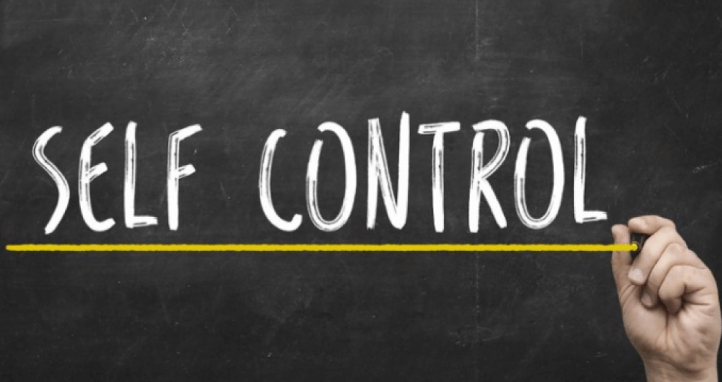Self-Control is Strength. Calmness is Mastery. You – Tymoff: Self-control and calmness are two powerful traits that can lead to personal growth, success, and a fulfilling life. In a world filled with distractions, stress, and constant demands on our attention, these qualities have never been more important. In this article, we will explore the significance of self-control and calmness in our lives, and how they can be harnessed to achieve mastery and personal excellence.
The Essence of Self-Control
Self-control is the ability to regulate one’s thoughts, emotions, and behaviors in order to achieve a desired outcome. It involves making conscious choices and resisting impulses that may lead to negative consequences. Self-control is often associated with willpower, discipline, and the ability to delay gratification.
The saying, “self-control is strength,” highlights the idea that having control over oneself is a sign of inner strength and resilience. It’s the ability to stay focused on long-term goals and resist the allure of short-term pleasures or distractions. Without self-control, it’s easy to succumb to temptations and make impulsive decisions that can lead to regret.
Self-control plays a crucial role in various aspects of life. In the realm of health and fitness, it’s the force that enables individuals to stick to a diet or exercise regimen, even when faced with the temptation of unhealthy food or the desire to skip a workout. In the realm of personal finance, self-control helps people save money, avoid unnecessary debt, and make wise financial decisions.
In relationships, self-control is essential for effective communication and conflict resolution. It allows individuals to manage their emotions and respond rationally rather than reacting impulsively to conflicts or disagreements. Additionally, self-control is vital for maintaining boundaries and making healthy choices in romantic relationships.
In the professional sphere, self-control is a valuable asset. It helps employees stay focused on their tasks, meet deadlines, and resist distractions such as social media or office gossip. Entrepreneurs and business leaders often rely on self-control to make strategic decisions and stay committed to their long-term visions.
The Power of Calmness
Calmness, on the other hand, is the state of being peaceful and composed, even in the face of challenges or adversity. It is the ability to maintain a clear and focused mind, regardless of external circumstances. Calmness is often associated with mastery because it allows individuals to navigate complex situations with grace and wisdom.
The saying, “calmness is mastery,” suggests that true mastery is not just about acquiring skills or knowledge but also about maintaining a calm and collected demeanor under pressure. When you are calm, you can think clearly, make better decisions, and perform at your best.
Calmness is not the absence of stress or difficult situations but rather the ability to manage them effectively. It involves emotional resilience, the capacity to stay centered when confronted with challenges, and the skill to avoid being overwhelmed by negative emotions like anger or fear.
In professional settings, calmness can be a game-changer. It allows leaders to inspire confidence in their teams, even during times of uncertainty. It enables individuals to handle high-pressure situations, such as presentations, negotiations, or crisis management, with poise and confidence.
In personal life, calmness enhances relationships. It helps people communicate more effectively, resolve conflicts peacefully, and create an atmosphere of trust and understanding. Calm individuals are often seen as approachable and reliable, making them sought-after friends and partners.
The Intersection of Self-Control and Calmness
While self-control and calmness are distinct qualities, they are closely interconnected and mutually reinforcing. Self-control provides the foundation for calmness by enabling individuals to manage their reactions and responses. When you have control over your impulses and emotions, it becomes easier to maintain a calm and composed demeanor.
Conversely, calmness enhances self-control. When you are calm, you are less likely to react impulsively or make decisions driven by anger or anxiety. Instead, you can step back, assess the situation, and choose a thoughtful course of action. Calmness creates a buffer between stimulus and response, allowing for more deliberate and rational decision-making.
Imagine a scenario in which someone is faced with a challenging and stressful situation at work. Without self-control, they may react with anger or frustration, potentially damaging their professional relationships and reputation. However, if they can exercise self-control by managing their emotions and responses, they can approach the situation with calmness, which increases the likelihood of finding a constructive solution.
In essence, self-control and calmness work hand in hand to promote personal mastery. Together, they enable individuals to navigate life’s complexities with resilience, wisdom, and grace.
Developing Self-Control and Calmness
Now that we understand the significance of self-control and calmness, the question arises: How can we develop and nurture these qualities in ourselves? Here are some practical steps to cultivate self-control and calmness:
- Self-Awareness: Start by becoming aware of your impulses, triggers, and emotional responses. Pay attention to situations that challenge your self-control and trigger stress or anxiety. Self-awareness is the first step towards making positive changes.
- Mindfulness and Meditation: Practicing mindfulness and meditation can help you stay present in the moment and reduce racing thoughts or anxiety. These techniques can also enhance your ability to remain calm in stressful situations.
- Set Clear Goals: Define your long-term goals and values. Having a clear sense of what you want to achieve can provide motivation and make it easier to resist short-term temptations.
- Practice Delayed Gratification: Challenge yourself to delay gratification in small ways, such as resisting the urge to check your phone or indulge in unhealthy snacks. Over time, this can strengthen your self-control.
- Healthy Lifestyle: A healthy diet, regular exercise, and adequate sleep can significantly impact your ability to stay calm and in control. These habits support overall well-being and emotional stability.
- Stress Management: Develop effective stress management techniques, such as deep breathing, progressive muscle relaxation, or seeking social support. Managing stress is essential for maintaining calmness.
- Seek Support and Guidance: If you struggle with self-control or managing your emotions, consider seeking support from a therapist, counselor, or support group. Professional guidance can provide valuable strategies and insights.
- Practice Patience: Understand that developing self-control and calmness is a journey that takes time and effort. Be patient with yourself and celebrate small victories along the way.
- Learn from Mistakes: Don’t be discouraged by occasional lapses in self-control or moments of heightened emotion. Use these experiences as opportunities for learning and growth.
- Visualization: Imagine yourself in challenging situations and visualize how you would respond with self-control and calmness. This mental rehearsal can prepare you for real-life scenarios.
The Benefits of Self-Control and Calmness
The benefits of cultivating self-control and calmness are numerous and far-reaching. Here are some of the rewards you can expect:
- Improved Relationships: Strong self-control and calmness enhance your ability to communicate effectively, resolve conflicts, and build trust in your relationships.
- Enhanced Decision-Making: These qualities enable you to make rational, well-thought-out decisions rather than reacting impulsively. This can lead to better choices in both personal and professional life.
- Stress Reduction: Self-control and calmness reduce the impact of stress on your mental and physical well-being. You are better equipped to handle challenging situations without becoming overwhelmed.
- Increased Productivity: In a professional context, these traits can boost productivity by helping you stay focused on tasks and minimize distractions.
- Emotional Resilience: Self-control and calmness build emotional resilience, allowing you to bounce back from setbacks and adversity more effectively.
- Enhanced Leadership Skills: For those in leadership roles, these qualities are essential for inspiring and leading teams with confidence and grace.
- Improved Health: Better self-control can lead to healthier lifestyle choices, while calmness can reduce stress-related health issues.
- Personal Fulfillment: Cultivating these qualities contributes to a sense of personal mastery and fulfillment. You become more in control of your life and destiny.
Case Study: The You – Tymoff Approach
One approach that has gained attention in recent years is the “You – Tymoff” method, which emphasizes the integration of self-control and calmness as a pathway to personal mastery. This approach, developed by renowned psychologist Dr. Rachel Tymoff, combines principles from cognitive-behavioral therapy, mindfulness, and emotional intelligence.
The “You – Tymoff” method begins with self-awareness and self-reflection, helping individuals identify areas where they struggle with self-control and experience emotional turbulence. Through guided exercises and practical strategies, the method encourages individuals to develop greater self-control and cultivate a sense of calmness.
One of the key principles of the “You – Tymoff” approach is the concept of “emotional space.” This idea suggests that by creating space between a stimulus and your response, you can choose how to react consciously. This space allows you to exercise self-control and respond with calmness, even in challenging situations.
The method also emphasizes the importance of self-compassion and non-judgment. Dr. Tymoff believes that individuals can be their own harshest critics, which can undermine self-control and contribute to emotional turmoil. By practicing self-compassion and self-acceptance, individuals can build a more stable foundation for self-control and calmness.
Additionally, the “You – Tymoff” approach incorporates mindfulness techniques to enhance calmness and emotional regulation. Mindfulness exercises, such as meditation and deep breathing, are integrated into the method to help individuals stay present and centered.
The “You – Tymoff” approach has garnered positive feedback from those who have embraced its principles. Many individuals report significant improvements in their ability to manage stress, control their impulses, and maintain a calm and composed demeanor.
Conclusion
In a world filled with external challenges and distractions, it’s easy to overlook the incredible power that lies within each of us. Self-control is not just about resisting temptation; it’s about harnessing our inner strength to achieve our goals and dreams. Calmness is not merely the absence of chaos; it’s the mastery of our own emotions and reactions. Goddard veterinary group chalfont st peter lower road chalfont saint peter gerrards cross
The saying, “self-control is strength. Calmness is mastery. You – Tymoff,” reminds us that these qualities are not elusive traits possessed by a select few. They are skills that can be developed and cultivated by anyone willing to invest the time and effort.
As you embark on your journey to harness the power of self-control and calmness, remember that it’s not about perfection but progress. Every step you take towards greater self-awareness and emotional regulation brings you closer to personal mastery. Embrace the power within you, and you’ll find that self-control and calmness are not just attributes; they are the keys to a more fulfilling and successful life.









